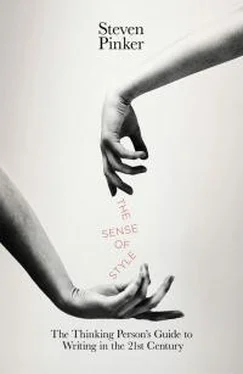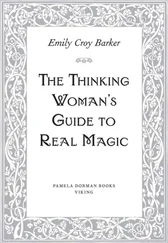In the 1960s an opposing school emerged, inspired by academic linguistics and theories of progressive education. The ringleaders of this school are Descriptivists: they describe how language actually is used rather than prescribing how it ought to be used. Descriptivists believe that the rules of correct usage are nothing more than the secret handshake of the ruling class, designed to keep the masses in their place. Language is an organic product of human creativity, say the Descriptivists, and people should be allowed to write however they please.
The Descriptivists are hypocrites: they adhere to standards of correct usage in their own writing but discourage the teaching and dissemination of those standards to others, thereby denying the possibility of social advancement to the less privileged.
The Descriptivists had their way with the publication of Webster’s Third New International Dictionary in 1961, which accepted such errors as ain’t and irregardless. This created a backlash that led to Prescriptivist dictionaries such as The American Heritage Dictionary of the English Language. Ever since then, Prescriptivists and Descriptivists have been doing battle over whether writers should care about correctness.
What’s wrong with this fairy tale? Pretty much everything. Let’s begin with the very idea of objective correctness in language.
What does it mean to say that it is incorrect to end a sentence with a preposition, or to use decimate to mean “destroy most of” rather than “destroy a tenth of”? After all, these are not logical truths that one could prove like theorems, nor are they scientific discoveries one could make in the lab. And they are certainly not the stipulations of some governing body, like the rules of Major League Baseball. Many people assume that there is such a governing body, namely the makers of dictionaries, but as chair of the Usage Panel of the famously prescriptive American Heritage Dictionary ( AHD ), I am here to tell you that this assumption is false. When I asked the editor of the dictionary how he and his colleagues decide what goes into it, he replied, “We pay attention to the way people use language.”
That’s right: when it comes to correct English, there’s no one in charge; the lunatics are running the asylum. The editors of a dictionary read a lot, keeping their eyes open for new words and senses that are used by many writers in many contexts, and the editors add or change the definitions accordingly. Purists are often offended when they learn that this is how dictionaries are written. In his famous 1962 smackdown of Webster’s Third, the literary critic Dwight Macdonald declared that even if nine-tenths of English speakers were to use a word incorrectly (say, nauseous meaning “nauseated” rather than “nauseating”), the remaining tenth would be correct (he did not say by what criterion or on whose authority), and the dictionaries should back them up. 1But no lexicographer could carry out Macdonald’s mandate. A dictionary that instructed its users to write in a way that guaranteed they would be misunderstood would be as useless as the Hungarian–English phrasebook in the Monty Python sketch which translated “Can you direct me to the train station?” as Please fondle my buttocks .
At the same time, there is something that is objectively true about usage. We can all agree that George W. Bush spoke incorrectly when he asked, “Is our children learning?”—and when he used inebriating to mean “exhilarating,” referred to the citizens of Greece as “Grecians,” and lamented policies that “vulcanize” (rather than Balkanize ) society. Even Bush, in a self-deprecating speech, agreed that these were errors. 2
So how can we reconcile the conviction that certain usages are wrong with the absence of any authority that ever decided what was right? The key is to recognize that the rules of usage are tacit conventions . A convention is an agreement among the members of a community to abide by a single way of doing things. There need not be any inherent advantage to which choice is made, but there is an advantage to everyone making the same choice. Familiar examples include standardized weights and measures, electrical voltages and cables, computer file formats, and paper currency.
The conventions of written prose represent a similar standardization. Countless idioms, word senses, and grammatical constructions have been coined and circulated by the universe of English speakers. Linguists capture their regularities in “descriptive rules”—that is, rules that describe how people speak and understand. Here are a few of them:
The subject of a tensed verb must be in nominative case, such as I, he, she, and they .
The first-person singular form of the verb be is am.
The verb vulcanize means “to strengthen a material such as rubber by combining it with sulfur and then applying heat and pressure.”
Many of these rules have become entrenched in a vast community of English speakers, who respect the rules without ever having to think about them. That’s why we laugh at Cookie Monster, LOLcats, and George W. Bush.
A subset of these conventions are less widespread and natural, but they have become accepted by a smaller virtual community of literate speakers for use in public forums such as government, journalism, literature, business, and academia. These conventions are “prescriptive rules”—rules that prescribe how one ought to speak and write in these forums. Unlike the descriptive rules, many of the prescriptive rules have to be stated explicitly, because they are not second nature to most writers: the rules may not apply in the spoken vernacular, or they may be difficult to implement in complicated sentences which tax the writer’s memory (chapter 4). Examples include the rules that govern punctuation, complex forms of agreement, and fine semantic distinctions between uncommon words like militate and mitigate and credible and credulous .
What this means is that there is no such thing as a “language war” between Prescriptivists and Descriptivists. The alleged controversy is as bogus as other catchy dichotomies such as nature versus nurture and America: Love It or Leave It . It is true that descriptive and prescriptive rules are different kinds of things and that descriptive and prescriptive grammarians are engaged in different kinds of activities. But it’s not true that if one kind of grammarian is right then the other kind of grammarian is wrong.
Once again I can write from authority. I am, among other things, a descriptive linguist: a card-carrying member of the Linguistic Society of America who has written many articles and books on how people use their mother tongue, including words and constructions that are frowned upon by the purists. But the book you are holding is avowedly prescriptivist: it consists of several hundred pages in which I am bossing you around. While I am fascinated by the linguistic exuberance of the vox populi, I’d be the first to argue that having prescriptive rules is desirable, indeed indispensable, in many arenas of writing. They can lubricate comprehension, reduce misunderstanding, provide a stable platform for the development of style and grace, and signal that a writer has exercised care in crafting a passage.
Once you understand that prescriptive rules are the conventions of a specialized form of the language, most of the iptivist controversies evaporate. One of them surrounds the linguist’s defense of nonstandard forms like ain’t, brang, and can’t get no (the so-called double negative) against the common accusation that they are products of laziness or illogic (an accusation that easily mixes with racism or class prejudice). History tells us that the reason that standard English prefers the alternatives isn’t, brought, and can’t get any is not that the two versions were ever weighed on their merits and the standard forms discovered to be superior. No, they are just frozen historical accidents: the “correct” forms are those that happened to be used in the dialect spoken in the region around London when written English first became standardized several centuries ago. If history had unfolded differently, today’s correct forms could have been incorrect, and vice versa. The London dialect became the standard of education, government, and business, and it was also the dialect of better-educated and more affluent speakers throughout the Anglosphere. Double negatives, ain’t, and other nonstandard forms soon became stigmatized by their association with the less prestigious dialects of English used by its poorer and less educated speakers.
Читать дальше












